Standard
Commercial names
Airbag, Planar, Accelerator
Characteristics:
- Replication of upward movements of the underlying asset’s price
- Capital protection at maturity up to a pre-arranged limit
- Reduction of losses if the underlying asset’s price is lower than the pre-arranged level when converted through a specific factor (called “airbag ratio)
Return profiles
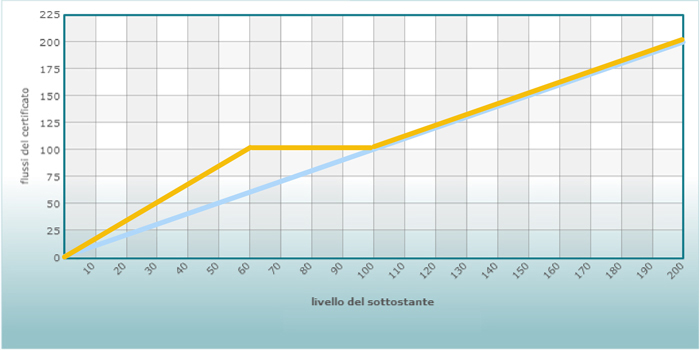
| Maturity | 2 -years |
| Investment horizon | Mid/long term |
| Aim | To obtain profits from the upward movements of the underlying asset’s price, with reduction or elimination of the effects of negative performances if the underlying asset’s price drops below a pre-arranged level (airbag stop) |
| Strategy | Bullish |
| Capital protection at maturity/Risk | Limited capital protection at maturity; full replication of the underlying asset’s downward price movements if the underlying asset’s value at maturity is lower than a pre-arranged level. |
Learn more
Investment certificates are financial products characterized by a number of features. They may simply replicate the underlying asset’s upward movements or downward movements, or they may be structured so as to implement more sophisticated strategies, which may include total or conditional capital protection against bad performances of the underlying asset (protection component).
Some certificates’ characteristics may also allow the owners to obtain proceeds during the life of the certificate, under condition that specific events take place (income component). A premium may be paid at maturity under form of additional proceeds in case the underlying asset’s price does not drop under the barrier (this is the case, for example, of bonus certificates).
The return on investment in some typologies of certificates may be determined by both the changes in the underlying asset’s price and the absence of such price movements for a timespan shorter than the life of the contract (early reimbursement component). These certificates pay a sort of premium for early redemption in case the underlying asset’s price is above a certain level on pre-arranged dates.
Moreover, some certificates feature an additional element, useful in periods of strong fluctuations of exchange rates – a protection against unfavourable changes in currency value. Products offering such protection, called “Quantum”, make it possible to invest in underlying asset’s denominated in a foreign currency avoiding exposure to the risks linked to exchange rates.
Features
The certificates’ payoff characteristics imply the following components: protection component, participation to upward movements in the underlying asset’s price.
Performance drivers
Reactivity of the certificates’ prices to changes in key variables.
| Variables | Issue | Barrier** | Life residual*** |
Commercial names
Airbag Autocallable
Characteristics:
- Early redemption (pre-arranged amount) if the underlying asset’s price is higher than or equal to a pre-arranged value on certain dates
- Capital protection at maturity up to a pre-arranged limit
- Reduction of losses if the underlying asset’s price is lower than the pre-arranged level when converted through a specific factor (called “airbag ratio)
Return profiles
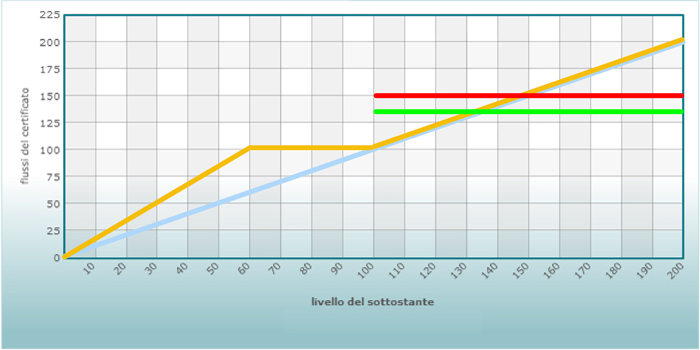
| Maturity | 2 - 5 years |
| Investment horizon | Mid/long term |
| Aim | To obtain profits from the upward movements of the underlying asset’s price, with reduction or elimination of the effects of negative performances if the underlying asset’s price drops below a pre-arranged level (airbag stop) |
| Strategy | Bullish |
| Capital protection at maturity/Risk | Limited capital protection at maturity; full replication of the underlying asset’s downward price movements if the underlying asset’s value at maturity is lower than a pre-arranged level |
Learn more
Investment certificates are financial products characterized by a number of features. They may simply replicate the underlying asset’s upward movements or downward movements, or they may be structured so as to implement more sophisticated strategies, which may include total or conditional capital protection against bad performances of the underlying asset (protection component).
Some certificates’ characteristics may also allow the owners to obtain proceeds during the life of the certificate, under condition that specific events take place (income component). A premium may be paid at maturity under form of additional proceeds in case the underlying asset’s price does not drop under the barrier (this is the case, for example, of bonus certificates).
The return on investment in some typologies of certificates may be determined by both the changes in the underlying asset’s price and the absence of such price movements for a timespan shorter than the life of the contract (early reimbursement component). These certificates pay a sort of premium for early redemption in case the underlying asset’s price is above a certain level on pre-arranged dates.
Moreover, some certificates feature an additional element, useful in periods of strong fluctuations of exchange rates – a protection against unfavourable changes in currency value. Products offering such protection, called “Quantum”, make it possible to invest in underlying asset’s denominated in a foreign currency avoiding exposure to the risks linked to exchange rates./p>
Features
The certificates’ payoff characteristics imply the following components: protection component, participation to upward movements in the underlying asset’s price, early reimbursement component.
Performance drivers
Reactivity of the certificates’ prices to changes in key variables.
| Variables | Issue | Barrier** | Life residual*** |
Commercial names
Airbag Best Of
Characteristics:
- Replication of the underlying asset’s price movements (the underlying asset consists of a basket of securities, among which the best-performing determinates the overall performance of the certificate)
- Capital protection at maturity up to a pre-arranged limit
- Reduction of losses if the underlying asset’s price is lower than the pre-arranged level when converted through a specific factor (called “airbag ratio)
Return profiles
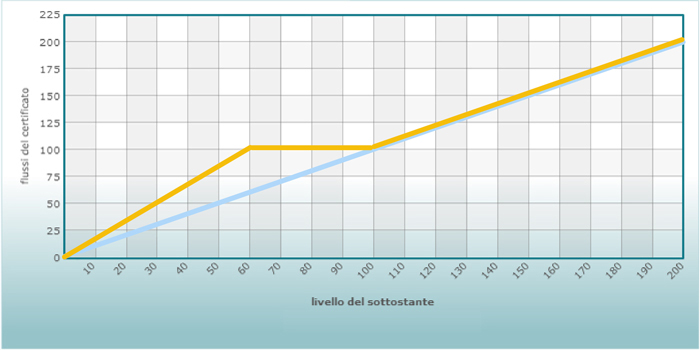
| Maturity | 2 - 5 years |
| Investment horizon | Mid/long term |
| Aim | To obtain profits from the upward movements of the underlying asset’s price, with reduction or elimination of the effects of negative performances if the underlying asset’s price drops below a pre-arranged level (airbag stop). |
| Strategy | Bullish |
| Capital protection at maturity/Risk | limited capital protection at maturity; full replication of the underlying asset’s downward price movements if the underlying asset’s value at maturity is lower than a pre-arranged level. |
Learn more
Investment certificates are financial products characterized by a number of features. They may simply replicate the underlying asset’s upward movements or downward movements, or they may be structured so as to implement more sophisticated strategies, which may include total or conditional capital protection against bad performances of the underlying asset (protection component).
Some certificates’ characteristics may also allow the owners to obtain proceeds during the life of the certificate, under condition that specific events take place (income component). A premium may be paid at maturity under form of additional proceeds in case the underlying asset’s price does not drop under the barrier (this is the case, for example, of bonus certificates).
The return on investment in some typologies of certificates may be determined by both the changes in the underlying asset’s price and the absence of such price movements for a timespan shorter than the life of the contract (early reimbursement component). These certificates pay a sort of premium for early redemption in case the underlying asset’s price is above a certain level on pre-arranged dates.
Moreover, some certificates feature an additional element, useful in periods of strong fluctuations of exchange rates – a protection against unfavourable changes in currency value. Products offering such protection, called “Quantum”, make it possible to invest in underlying asset’s denominated in a foreign currency avoiding exposure to the risks linked to exchange rates.
Features
The certificates’ payoff characteristics imply the following components: protection component, participation to upward movements in the underlying asset’s price.
Performance drivers
Reactivity of the certificates’ prices to changes in key variables.
| Variables | Issue | Barrier** | Life residual*** |
Commercial names
Airbag cap, Planar con Cap, Accelerator con Cap
Characteristics:
- Replication of the underlying asset’s price upward movements with a cap on potential returns
- Capital protection at maturity up to a pre-arranged limit
- Reduction of losses if the underlying asset’s price is lower than the pre-arranged level when converted through a specific factor (called “airbag ratio)
Return profiles
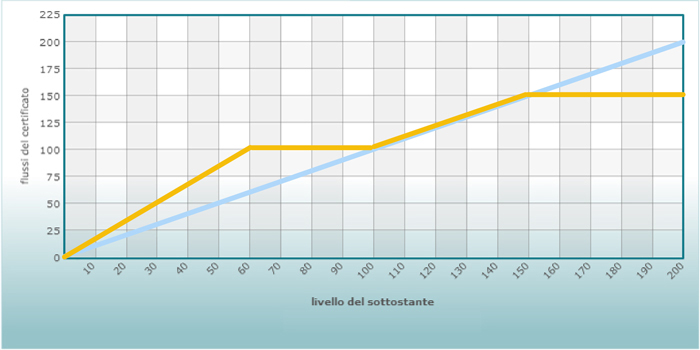
| Maturity | 2 - 5 years |
| Investment horizon | Mid/long term |
| Aim | To obtain profits from the upward movements of the underlying asset’s price, with reduction or elimination of the effects of negative performances if the underlying asset’s price drops below a pre-arranged level (airbag stop) |
| Strategy | Moderately bullish |
| Capital protection at maturity/Risk | Limited capital protection at maturity; full replication of the underlying asset’s downward price movements if the underlying asset’s value at maturity is lower than a pre-arranged level |
Learn more
Investment certificates are financial products characterized by a number of features. They may simply replicate the underlying asset’s upward movements or downward movements, or they may be structured so as to implement more sophisticated strategies, which may include total or conditional capital protection against bad performances of the underlying asset (protection component).
Some certificates’ characteristics may also allow the owners to obtain proceeds during the life of the certificate, under condition that specific events take place (income component). A premium may be paid at maturity under form of additional proceeds in case the underlying asset’s price does not drop under the barrier (this is the case, for example, of bonus certificates).
The return on investment in some typologies of certificates may be determined by both the changes in the underlying asset’s price and the absence of such price movements for a timespan shorter than the life of the contract (early reimbursement component). These certificates pay a sort of premium for early redemption in case the underlying asset’s price is above a certain level on pre-arranged dates.
Moreover, some certificates feature an additional element, useful in periods of strong fluctuations of exchange rates – a protection against unfavourable changes in currency value. Products offering such protection, called “Quantum”, make it possible to invest in underlying asset’s denominated in a foreign currency avoiding exposure to the risks linked to exchange rates.
Features
The certificates’ payoff characteristics imply the following components: protection component, participation to upward movements in the underlying asset’s price.
Performance drivers
Reactivity of the certificates’ prices to changes in key variables.
| Variables | Issue | Barrier** | Life residual*** |
Commercial names
Airbag Worst Of
Characteristics:
- Replication of the underlying asset’s price movements (the underlying asset consists of a basket of securities, among which the worst-performing determinates the overall performance of the certificate)
- Capital protection at maturity up to a pre-arranged limit
- Reduction of losses if the underlying asset’s price is lower than the pre-arranged level when converted through a specific factor (called “airbag ratio)
Return profiles
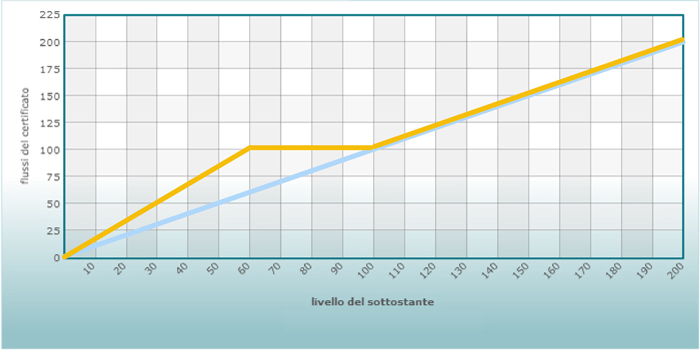
| Maturity | 2 - 5 years |
| Investment horizon | Mid/long term |
| Aim | To obtain profits from the upward movements of the underlying asset’s price, with reduction or elimination of the effects of negative performances if the underlying asset’s price drops below a pre-arranged level (airbag stop) |
| Strategy | Bullish |
| Capital protection at maturity/Risk | Limited capital protection at maturity; full replication of the underlying asset’s downward price movements if the underlying asset’s value at maturity is lower than a pre-arranged level |
Learn more
Investment certificates are financial products characterized by a number of features. They may simply replicate the underlying asset’s upward movements or downward movements, or they may be structured so as to implement more sophisticated strategies, which may include total or conditional capital protection against bad performances of the underlying asset (protection component).
Some certificates’ characteristics may also allow the owners to obtain proceeds during the life of the certificate, under condition that specific events take place (income component). A premium may be paid at maturity under form of additional proceeds in case the underlying asset’s price does not drop under the barrier (this is the case, for example, of bonus certificates).
The return on investment in some typologies of certificates may be determined by both the changes in the underlying asset’s price and the absence of such price movements for a timespan shorter than the life of the contract (early reimbursement component). These certificates pay a sort of premium for early redemption in case the underlying asset’s price is above a certain level on pre-arranged dates.
Moreover, some certificates feature an additional element, useful in periods of strong fluctuations of exchange rates – a protection against unfavourable changes in currency value. Products offering such protection, called “Quantum”, make it possible to invest in underlying asset’s denominated in a foreign currency avoiding exposure to the risks linked to exchange rates.
Features
The certificates’ payoff characteristics imply the following components: protection component, participation to upward movements in the underlying asset’s price.
Performance drivers
Reactivity of the certificates’ prices to changes in key variables.
| Variables | Issue | Barrier** | Life residual*** |
